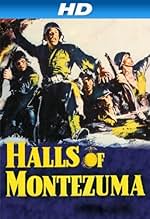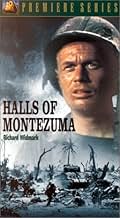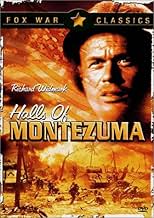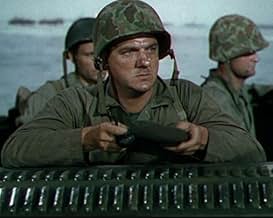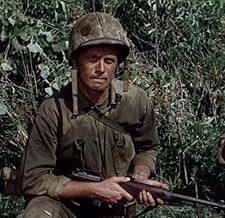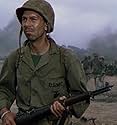CALIFICACIÓN DE IMDb
6.6/10
3.1 k
TU CALIFICACIÓN
Una compañía de marines corre contrarreloj para encontrar una base de cohetes japonesa.Una compañía de marines corre contrarreloj para encontrar una base de cohetes japonesa.Una compañía de marines corre contrarreloj para encontrar una base de cohetes japonesa.
- Dirección
- Guionista
- Elenco
Jack Palance
- Pigeon Lane
- (as Walter {Jack} Palance)
Richard Allan
- Pvt. Stewart
- (sin créditos)
Edward Binns
- First Soldier in Final Tracking Shot
- (sin créditos)
Robert Board
- Marine
- (sin créditos)
Robert Bohannon
- Soldier
- (sin créditos)
- Dirección
- Guionista
- Todo el elenco y el equipo
- Producción, taquilla y más en IMDbPro
Opiniones destacadas
The interesting and uncharacteristic film is a gripping war story from Lewis Milestone in that's all patriotic and all flag-waving with valiant US soldiers facing on Japanese enemy in the Pacific Basin . The Marines assault a strongly held enemy island in the Pacific to track down a Japanese rocket base . We follow them from the beach to a Japanese rocket site throughout enemy infested jungle , being commanded Lt. Anderson , an ex-school teacher (Richard Widmark) along with his old pupil Conroy (Richard Hylton) and other Privates as Coffman (Robert Wagner) , Pretty Boy (Skip Homeier) , Whitney (Martin Milner) , Slattery (Bert Freed) ; furtermore , a Sgt. called Zelenko (Neville Brand) , Sgt. Johnson (Reginald Gardiner) , Doc (Karl Malden) and a War Correspondent named Dickerman (Jack Webb) . Along the way , all of them are transformed into battle veterans.
This thrilling , large WWII yarn capably put together by a good filmmaker , concerns a company of Marines led by a two-fisted Lieutenant whose squad becomes a tight fighting unit , while races against the clock by hunt down a Japanese rocket base . Being a fast-moving , rather thoughtful little film about battles between Marines and Japanese and their strong resistance to the invasion , though some feats are hard to believe . It is all plenty with glory-glory , propaganda and martial music in the background , being compellingly made by the same man who 21 years earlier directed the landmark anti-war film ¨All quiet on the Western Front¨. This unnerving epic depicts the war horror , including atrocities by both sides while happen attacks during the invasion . Thought-provoking screenplay , including dramatic scenes in overall effects , also has moments of astounding power with some overwhelming war images . It is competently acted by a strong cast which plus stars Richard Widmark , there are Karl Malden , Skip Homeier , Robert Wagner and Jack Palance . In addition , Richard Boone as tough Lt. Col. Gilfillan , Reginald Gardner in a rare dramatic character and Jack Webb as a war correspondent.
The motion picture was well and powerfully directed by Lewis Milestone, who cut in actual combat footage along with the mock-up set-pieces filmed in the United States at Camp Pendleton . Lewis was born in the Ukraine , but emigrated to America at 18 and he served in WWI . He often made chronicles of wartime conflicts and persisted in showing horror war from the point of view of the ordinary soldier , providing a grimmer stuff as well as quieter moments . As he showed WWI (All quiet on the western front) , WWII (A walk in the sun , Purple heart , Halls of Motzuma , Edge and darkness) and Korean war (Pork Chop Hill) ; and directed several other excellent movies in different fields , drama (Of mice and men , Strange love of Martha Ivers) , adventures (Mutiny on the Bounty) and heist-comedy (Ocean's eleven) , among others . Rating : Better than average , 7/10 . Well worth watching .
This thrilling , large WWII yarn capably put together by a good filmmaker , concerns a company of Marines led by a two-fisted Lieutenant whose squad becomes a tight fighting unit , while races against the clock by hunt down a Japanese rocket base . Being a fast-moving , rather thoughtful little film about battles between Marines and Japanese and their strong resistance to the invasion , though some feats are hard to believe . It is all plenty with glory-glory , propaganda and martial music in the background , being compellingly made by the same man who 21 years earlier directed the landmark anti-war film ¨All quiet on the Western Front¨. This unnerving epic depicts the war horror , including atrocities by both sides while happen attacks during the invasion . Thought-provoking screenplay , including dramatic scenes in overall effects , also has moments of astounding power with some overwhelming war images . It is competently acted by a strong cast which plus stars Richard Widmark , there are Karl Malden , Skip Homeier , Robert Wagner and Jack Palance . In addition , Richard Boone as tough Lt. Col. Gilfillan , Reginald Gardner in a rare dramatic character and Jack Webb as a war correspondent.
The motion picture was well and powerfully directed by Lewis Milestone, who cut in actual combat footage along with the mock-up set-pieces filmed in the United States at Camp Pendleton . Lewis was born in the Ukraine , but emigrated to America at 18 and he served in WWI . He often made chronicles of wartime conflicts and persisted in showing horror war from the point of view of the ordinary soldier , providing a grimmer stuff as well as quieter moments . As he showed WWI (All quiet on the western front) , WWII (A walk in the sun , Purple heart , Halls of Motzuma , Edge and darkness) and Korean war (Pork Chop Hill) ; and directed several other excellent movies in different fields , drama (Of mice and men , Strange love of Martha Ivers) , adventures (Mutiny on the Bounty) and heist-comedy (Ocean's eleven) , among others . Rating : Better than average , 7/10 . Well worth watching .
When it was released in 1950, "Halls of Montezuma" was one of the most realistic and ambitious war movies yet made. Today its strengths still outweigh its unfortunate flaws. The flaws are an all-too-familiar sentimental streak, an absurd "revelation" about Japanese tactics, an unconvincing psycho in a clumsy explanatory flashback, and the unlikely presence, in Lt. Anderson's platoon, of a replacement who just happened to have been one of his high-school students in civilian life.
Many viewers will find such flaws even more annoying because they detract from the good things about this movie, including some solid performances (Widmark, Palance, Boone, Webb) a realistic plot, an unusually authentic look--including some (mostly) well integrated combat footage--and a spectacular scope. Until "The Longest Day" (1961), the beach landing here(with flame-throwing tanks)and the later assault on the Japanese were more impressive than any other screen depictions of a large military operation. (BTW, the failure of the Japanese to oppose the landing itself isn't a Hollywood howler; the movie accurately reflects the Japanese defense strategy on Okinawa in 1945.) Milestone's directorial masterpiece, "All Quiet on the Western Front" (1930), expresses revulsion at the slaughter of World War I. "Halls of Montezuma" affords a more complex view of men in World War II. The hero is a high-school chemistry teacher whose migraines have addicted him to painkillers; he doesn't care because he assumes he's going to be killed. One character is blinded and another killed by accident. By modern standards such incidents may seem relatively mild, but during the war such troubling images were thought to be too disturbing for film-goers. Even in 1950 they were strong stuff for a movie.
Made at a time when the Cold War was heating up dangerously in Korea, "Halls of Montezuma" is still a revealing postwar response to World War II in the Pacific.
Many viewers will find such flaws even more annoying because they detract from the good things about this movie, including some solid performances (Widmark, Palance, Boone, Webb) a realistic plot, an unusually authentic look--including some (mostly) well integrated combat footage--and a spectacular scope. Until "The Longest Day" (1961), the beach landing here(with flame-throwing tanks)and the later assault on the Japanese were more impressive than any other screen depictions of a large military operation. (BTW, the failure of the Japanese to oppose the landing itself isn't a Hollywood howler; the movie accurately reflects the Japanese defense strategy on Okinawa in 1945.) Milestone's directorial masterpiece, "All Quiet on the Western Front" (1930), expresses revulsion at the slaughter of World War I. "Halls of Montezuma" affords a more complex view of men in World War II. The hero is a high-school chemistry teacher whose migraines have addicted him to painkillers; he doesn't care because he assumes he's going to be killed. One character is blinded and another killed by accident. By modern standards such incidents may seem relatively mild, but during the war such troubling images were thought to be too disturbing for film-goers. Even in 1950 they were strong stuff for a movie.
Made at a time when the Cold War was heating up dangerously in Korea, "Halls of Montezuma" is still a revealing postwar response to World War II in the Pacific.
Halls Of Montezuma is a busy, Technicolored war film circa 1950, and was a big hit in its day. The story-line, such as it is, is convoluted and not really worth going into. Basically the film is about the psychology of war and its effect on human relations, especially those created by the war itself. A good deal of the film, as I recall, takes place in caves, ditches and deserted buildings. Unlike most war films this one emphasizes the fact the most soldiers, even Marines, are made, not born; they all come from someplace and would like to return there, preferably in one piece. Lewis Milestone directed the picture, and while it is a far cry from his classic All Quiet On the Western Front, this film is no shabby piece of work. Richard Widmark heads a cast of future stars, and they all perform well, if a bit too strenuously at times. The actors tend to be grouped together a good deal, maybe to ensure that no one can outshine anyone else, and this, plus the emphasis on isolated settings, succeeds in making the film strangely intimate. The color is bright and often glaring, and the Pacific island setting well-rendered. It's worth mentioning as a footnote that the studio that made the picture, 20th Century-Fox, would soon be switching over to making almost exclusively CinemaScope films, and would also soon be dropping Technicolor for the cheaper De Luxe color. Their post CinemaScope product is for the most part vastly inferior than what they previously had been doing, and Halls Of Montezuma, while not a great film, shows, even today, just how beautiful Technicolor could be. This, plus the use of the square, tidy space movies were limited to in those pre-wide screen days, makes for a depth in perspective that is at times almost seductive, even in so grim a film as this.
At age 10, in 1960, I watched the "Halls of Montezuma" movie on television. In 1968, I found myself in the U.S. Marine Corps serving as a machine-gunner in the infantry. Sometimes, movies have a way of becoming true reality; and, because the movie gave me a little insight and understanding of the brutality of war, in some way, I owe a debt of gratitude to the movie.
- Despite it's grand name, Halls of Montezuma is a small war film. What I mean is that the movie focuses more on a small group of men and their fears and problems than it does on a grand plan for Allied victory. It's a very personal movie. We get to see these men up-close and we begin to develop feelings for them. I wouldn't doubt that this is one of the first films to show a U.S. Lieutenant so battle scarred that he resorts to using pain killers just to function. Unlike other war films of this era, not all of these men are going to make it to the end. War is like that. It doesn't pick and chose people to live because we like them. So in that regard, it's also more realistic than some other war movies made in the 50s.
- To succeed as a small, personal war movie as I've described, the cast has to be able to act. This cast does not disappoint. Richard Widmark, Jack Webb, and Karl Malden are all excellent in their respective roles. I was especially impressed with Webb who has an acting style that can grate on the nerves. He's more subdued here and it works. But as good as these three are, Jack Palance is the highlight of the movie for me. He was undoubtedly the most believable. I could really picture him doing the things in real life that were called for in the script.
- I have no difficulty recommending Halls of Montezuma to fans of war films. It's a very welcome addition to my DVD collection.
¿Sabías que…?
- TriviaUS Marine and Navy units participated in the filming of this movie and after their work was finished, they went to fight in Korea.
- ErroresWhile speaking to his superiors on his walkie-talkie, Lt Anderson twice closes his conversation with "Over and out." This is incorrect. He should have said either "Over" (if he was turning the conversation over to the other speaker), or "Out" (if he was ending the talk). Interestingly, Anderson uses the correct term "Out" later in the film.
- Citas
Sgt. Randolph Johnson: Wasn't there a comment by your General Sherman about war?
Lt. Butterfield: Yeah, he said, "War is Hell." What did he know, that eight-ball never left the States.
- Créditos curiososCurrent prints open with the mid 1980's 20th Century Fox logo.
- ConexionesEdited into El asalto a Tarawa (1958)
- Bandas sonorasMarines' Hymn
(uncredited)
Music from the "Gendarmes' Duet" from the opera "Geneviève de Brabant"
Written by Jacques Offenbach
Sung over the opening credits
Also played during the first landing
Selecciones populares
Inicia sesión para calificar y agrega a la lista de videos para obtener recomendaciones personalizadas
- How long is Halls of Montezuma?Con tecnología de Alexa
Detalles
- Fecha de lanzamiento
- País de origen
- Idiomas
- También se conoce como
- Halls of Montezuma
- Locaciones de filmación
- Marine Corps Base Camp Pendleton, California, Estados Unidos(I know this, as my father was in boot camp at the time and his squad were used as extras for four days at this location, for this film.)
- Productora
- Ver más créditos de la compañía en IMDbPro
- Tiempo de ejecución1 hora 53 minutos
- Relación de aspecto
- 1.37 : 1
Contribuir a esta página
Sugiere una edición o agrega el contenido que falta

Principales brechas de datos
By what name was Hasta el último hombre (1951) officially released in India in English?
Responda

